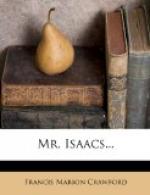“Excuse me,” said I, “if I make a digression. I think there are two classes of minds commonly to be found among thinkers all over the world. The one seek to attain to knowledge, the others strive to acquire it. There is a class of commonplace intellects who regard knowledge of all kinds in the light of a ladder; one ladder for each science, and the rungs of the ladders are the successive facts mastered by an effort and remembered in the order they have been passed. These persons think it is possible to attain to high eminence on one particular ladder, that is, in one particular science, without having been up any of the other ladders, that is, without a knowledge of other branches of seience. This is the mind of the plodder, the patient man who climbs, step by step, in his own unvarying round of thought; not seeing that it is but the wheel of a treadmill over which he is labouring, and that though every step may pass, and repass, beneath his toiling feet, he can never obtain a birdseye view of what he is doing, because his eyes are continually fixed on the step in front.”
“But,” I continued, as Isaacs assented to my simile by a nod, “there is another class of minds also. There are persons who regard the whole imaginable and unimaginable knowledge of mankind, past, present, and future, as a boundless plain over which they hang suspended and can look down. Immediately beneath them there is a map spread out which represents, in the midst of the immense desert, the things they themselves know. It is a puzzle map, like those they make for children, where each piece fits into its appointed place, and will fit nowhere else; every piece of knowledge acquired fits into the space allotted to it, and when there is a piece, that is, a fact, wanting, it is still possible to define its extent and shape by the surrounding portions, though all the details of colour and design are lacking. These are the people who regard knowledge as a whole, harmonious, when every science and fragment of a science has its appointed station and is necessary to completeness of perfect knowledge. I hope I have made clear to you what I mean, though I am conscious of only sketching the outlines of a distinction which I believe to be fundamental.”
“Of course it is fundamental. Broadly, it is the difference between analytic and synthetic thought; between the subjective and the objective views; between the finite conception of a limited world and the infinite ideal of perfect wisdom. I understand you perfectly.”
“You puzzle me continually, Isaacs. Where did you learn to talk about ‘analytic’ and ‘synthetic,’ and ‘subjective’ and ‘objective,’ and transcendental analysis, and so forth?” It seemed so consistent with his mind that he should understand the use of philosophical terms, that I had noi realised how odd it was that a man of his purely Oriental education should know anything about the subject. His very broad application of the words ‘analytic’ and ‘synthetic’ to my pair of illustrations attracted my attention and prompted the question I had asked.




